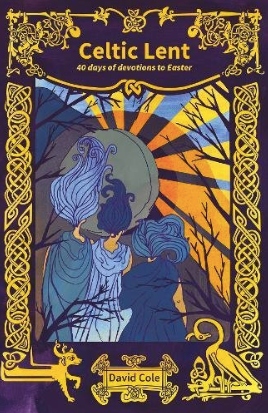Celtic Lent – 40 days of devotions to Easter
Readers looking for a Lent book with a different slant will find a good example here, but be prepared to be challenged by the teaching and example of Celtic Christians, ancient and modern
 Celtic Lent – 40 days of devotions to Easter
Celtic Lent – 40 days of devotions to Easter
By David Cole
BRF
ISBN 9780857466372
Reviewed by John Matthews
Of the writing of Lent books there appears to be no end but, as the title suggests, this is different from others. The author of this one, who has previously written Celtic Advent and 40 days with the Celtic Saints, is described on the back cover as ‘previously a full time church minister…an international spiritual teacher and retreat leader, an award-winning author and the Deputy Guardian for the Community of Aidan and Hilda. He is also the founder of Waymark Ministries, which creates opportunities for people to engage with the Christian message.’
The book has material for every day of the season and draws on some of the writings and monastic Rules of the Celtic saints. It also includes some of the more modern expressions and inspirations of Celtic Christianity that flow within the current streams of Christianity. Many fascinating stories and other thought-provoking points could be quoted. This reviewer was struck by the three types of martyrdom; white – when one gives up everything held dear/one’s familiar lifestyle; green – when one commits to spiritual discipline and gives up some form of comfort to do so; and red – when one gives one’s physical life.
The material for each complete week has a theme but there are no headings to this effect. For each day (except Sundays, which are not counted in the 40 days of Lent, and for which there is a very brief contemplation in the form of a statement or question) there are two to three pages, which follow the same pattern. Each begins with a page or more relating to Celtic spirituality, followed by a section headed ‘Contemplation’, then there is a passage of scripture (with the exception of one from The Didache), and a prayer. The scripture is chosen to relate to the Celtic material, but those looking for a book which expounds biblical passages will probably want to look elsewhere. The reasoning behind the order of these sections is not explained and, personally, I found it more helpful to read the scripture before spending time in contemplation.
There are numerous endnotes, mainly giving the sources of passages quoted, but it would have been useful to have had these sources collected together in a bibliography.
The book is well produced, with a clearer than usual typeface, and is reasonably priced. Readers looking for a Lent book with a different slant will find a good example here. But be warned! Don’t read it unless you are prepared to be challenged, as well as informed, by the teaching and example of Celtic Christians, ancient and modern.
John Matthews is a retired Baptist minister living in Rushden, Northants
Baptist Times, 15/02/2019